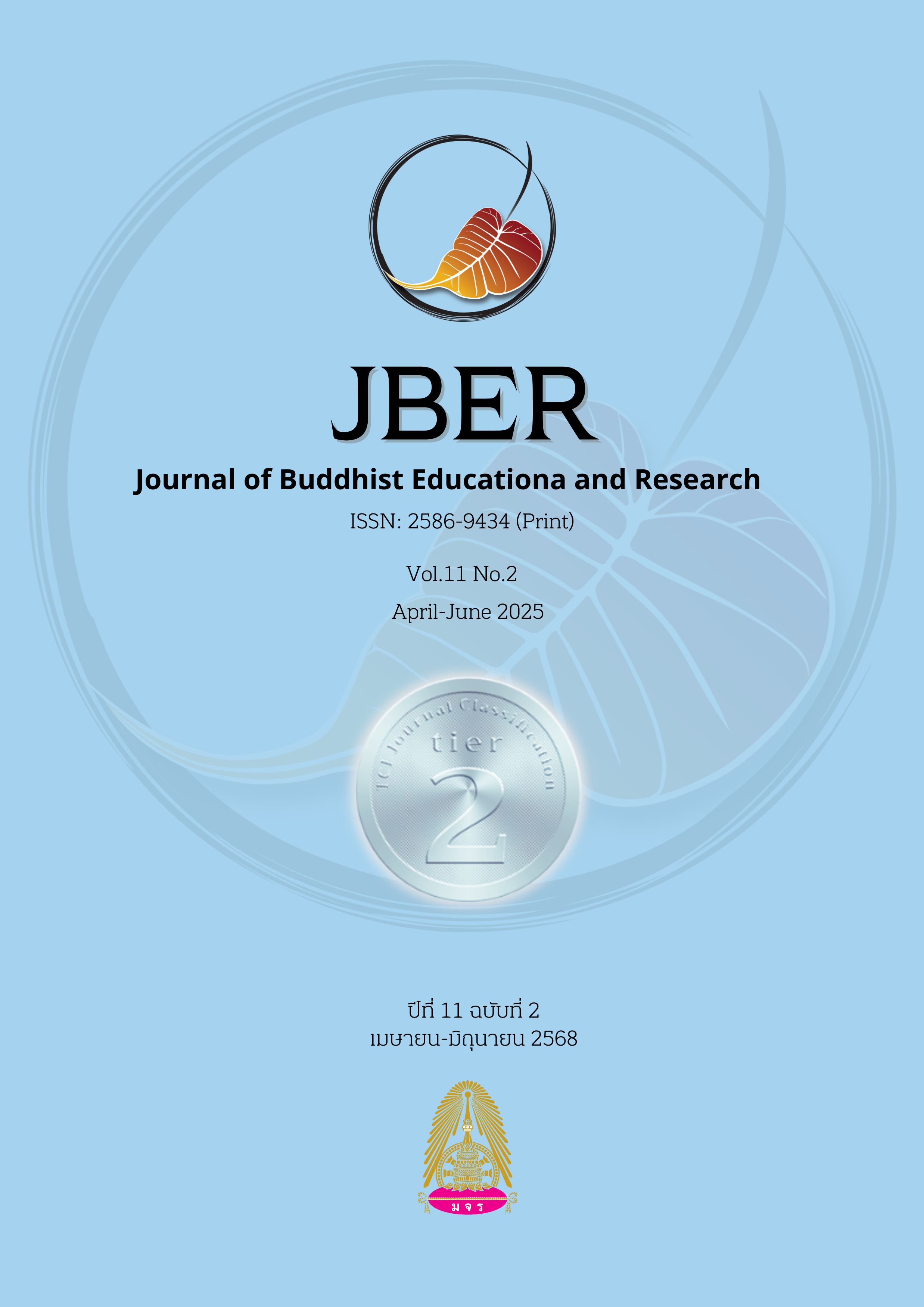Guidelines for Developing Academic Administration in the Digital Era of Educational Institutions Saowittayakhet Bangmunnak, Phichit Secondary Educational Service Area Office
Keywords:
Keywords: Development Guidelines, Academic Administration, Digital Era, Educational Management, School ClusterAbstract
This study employed a mixed-methods research design to investigate and develop academic administration in the digital era within the Bang Mun Nak school cluster, under the jurisdiction of the Phichit Secondary Educational Service Area Office. The objectives were to examine the current conditions and problems of academic administration in the digital age, to formulate guidelines for its development, and to evaluate the appropriateness and feasibility of those guidelines. The sample group consisted of 162 participants, including school administrators, teachers, and educational personnel, along with 9 experts. Data were collected through questionnaires and interviews. Quantitative data were analyzed using frequency, percentage, mean, and standard deviation, while qualitative data were analyzed through content analysis. The findings revealed that the overall condition of academic administration in the digital era was at a high level (x̅ = 3.89, S.D. = 0.40). The most significant problem identified was the lack of research to support educational quality development. This was followed by challenges in the internal quality assurance system and in the teaching and learning processes. Based on the data collected, several development guidelines were proposed. Schools should promote collaboration among school staff, parents, community leaders, and local administrative organizations to align educational development with community needs. Budget planning for technology and learning materials should be emphasized, ensuring sufficient resources are allocated to support digital teaching. The use of technology in student assessment and evaluation should be encouraged, integrating modern tools to increase accuracy and efficiency. Furthermore, research should be actively promoted as part of the criteria for teacher promotion and recognition. Teachers should be encouraged to use free and effective educational software and digital learning tools. The internal quality assurance system should be clearly linked with the school’s overall development policy, and academic supervision should be supported through clear and comprehensive manuals to guide implementation. The evaluation of these development guidelines showed that they were highly appropriate and feasible for practical use. These findings offer valuable insights for schools and educational administrators seeking to enhance academic management in line with digital transformation.
References
จิณณวัตร ปะโคทัง. (2561). ภาวะผู้นํายุคดิจิทัลสําหรับผู้บริหารโรงเรียนมืออาชีพ. อุบลราชธานี: ศิริธรรมออฟเซ็ท.
จิรารัตน์ กระจ่างดี. (2562). การศึกษากลยุทธ์การบริหารงานวิชาการของโรงเรียนขยายโอกาสในอำเภอขุนยวม จังหวัดแม่ฮ่องสอน (วิทยานิพนธ์ครุศาสตรมหาบัณฑิต). มหาวิทยาลัยราชภัฏเชียงใหม่.
ธัญญารัตน์ สิงห์นาค. (2562). ปัญหาและแนวทางการแก้ปัญหาการบริหารงานวิชาการของโรงเรียนตามทัศนะของครูในกลุ่มโรงเรียนศรีราชา 3 สังกัดสำนักงานเขตพื้นที่การศึกษาประถมศึกษาชลบุรี เขต 3 (วิทยานิพนธ์ศึกษาศาสตรมหาบัณฑิต). มหาวิทยาลัยบูรพา.
นัฎจรีภรณ์ ไขรัศมี. (2566). การพัฒนาแนวทางการบริหารงานวิชาการของสถานศึกษาในยุคดิจิทัล สังกัดสำนักงานเขตพื้นที่การศึกษาประถมศึกษากาฬสินธุ์ เขต 2. วารสารการบริหารการศึกษา มมร. วิทยาเขตร้อยเอ็ด, 3(3).
พัชมณ สระแก้ว. (2560). ปัญหาและแนวทางแก้ปัญหาการบริหารงานวิชาการของโรงเรียนขนาดเล็ก สังกัดสำนักงานเขตพื้นที่การศึกษามัธยมศึกษาบุรีรัมย์ เขต 32 (วิทยานิพนธ์ครุศาสตรมหาบัณฑิต). มหาวิทยาลัยราชภัฏบุรีรัมย์.
พุทธมาตย์ ยาคง. (2567). แนวทางการบริหารงานวิชาการของสถานศึกษาในยุคดิจิทัลสู่ความเป็นเลิศ สังกัดสำนักงานเขตพื้นที่การศึกษามัธยมศึกษาเลย หนองบัวลำภู (วิทยานิพนธ์ครุศาสตรมหาบัณฑิต). มหาวิทยาลัยราชภัฏเลย.
พุทธชาด แสนอุบล. (2560). สภาพ ปัญหา และแนวทางการปรับปรุงการนิเทศภายในโรงเรียนมัธยมศึกษา สังกัดสำนักงานเขตพื้นที่การศึกษามัธยมศึกษา เขต 20 (วิทยานิพนธ์ครุศาสตรมหาบัณฑิต). มหาวิทยาลัยบูรพา.
พรชัย เจดามาน, และคณะ. (2559). ยุทธศาสตร์การพัฒนาเพื่อการบริหารจัดการสู่การเปลี่ยนผ่านศตวรรษที่ 21 ไทยแลนด์ 4.0. วารสารหลักสูตรและการเรียนการสอน คณะคุรุศาสตร์ มหาวิทยาลัยราชภัฏมหาสารคาม, 6(2), 1–12.
โรงเรียนบางมูลนากภูมิวิทยาคม. (2566). รายงานการประเมินตนเองของสถานศึกษา (SAR) ประจำปีการศึกษา 2566.
โรงเรียนโพธิธรรมสุวัฒน์. (2565). รายงานผลการดำเนินการตามแผนปฏิบัติการ ประจำปี 2565.
โรงเรียนโพธิ์ไทรงามวิทยาคม. (2566). รายงานการประเมินตนเองของสถานศึกษา (SAR) ประจำปีการศึกษา 2566.
โรงเรียนแหลมรังวิทยาคม. (2566). รายงานการประเมินตนเองของสถานศึกษา (SAR) ประจำปีการศึกษา 2566.
วีรภัทร ภักดีพงษ์. (2565). แนวทางการบริหารงานวิชาการในสถานศึกษายุคดิจิทัลตามหลักสัปปุริสธรรม 7 ของโรงเรียนในสังกัดสำนักงานเขตพื้นที่การศึกษามัธยมศึกษากำแพงเพชร (วิทยานิพนธ์พุทธศาสตรมหาบัณฑิต). มหาวิทยาลัยมหาจุฬาลงกรณราชวิทยาลัย.
ศรีรวี ศรีเทียม. (2567). การบริหารงานวิชาการโรงเรียนขนาดเล็กในยุคดิจิทัลของอำเภอไทรงาม สังกัดสำนักงานเขตพื้นที่การศึกษาประถมศึกษากำแพงเพชร เขต 1 (วิทยานิพนธ์ศึกษาศาสตรมหาบัณฑิต). มหาวิทยาลัยนอร์ท-เชียงใหม่.
สุกัญญา แช่มช้อย. (2562). การบริหารสถานศึกษาในยุคดิจิทัล (พิมพ์ครั้งที่ 2). กรุงเทพฯ: สำนักพิมพ์จุฬาลงกรณ์มหาวิทยาลัย.
สำนักงานเลขาธิการสภาการศึกษา. (2560). แผนการศึกษาแห่งชาติ พ.ศ. 2560–2579. กรุงเทพมหานคร: พริกหวานกราฟฟิค จำกัด.
สำนักงานเขตพื้นที่การศึกษามัธยมศึกษาพิจิตร. (2566). รายงานการสังเคราะห์การประเมินตนเองของสถานศึกษา (SAR) ประจำปี 2566.
อนิรุทธ์ ภู่ทิม. (2563). ปัญหาและแนวทางการพัฒนาการบริหารงานวิชาการของโรงเรียนมัธยมศึกษาในอำเภอบ้านบึง จังหวัดชลบุรี สังกัดสำนักงานเขตพื้นที่การศึกษามัธยมศึกษา เขต 18 (วิทยานิพนธ์ศึกษาศาสตรมหาบัณฑิต). มหาวิทยาลัยบูรพา.
Downloads
Published
How to Cite
Issue
Section
License
Copyright (c) 2025 Journal of Buddhist Education and Research (JBER)

This work is licensed under a Creative Commons Attribution-NonCommercial-NoDerivatives 4.0 International License.





